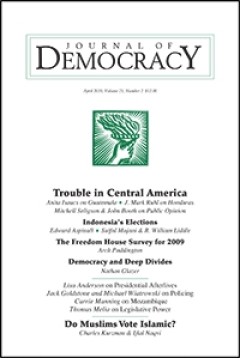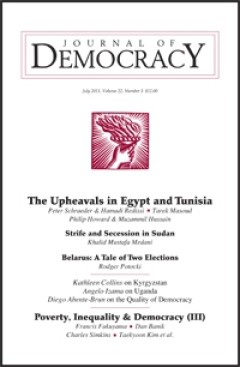Filter by

The Lessons of 1989
The Arab events of 2011 may have some similarities to the wave of popular upheavals against authoritarianism that swept the Soviet bloc starting in 1989, but the differences are much more fundamental.
- Edition
- Volume 22, Number 4, October 2011,pp. 13-23
- ISBN/ISSN
- 10455736
- Collation
- -
- Series Title
- Journal of Democracy
- Call Number
- -

The Role of the Military
Across the Arab world, militaries have played a key role in determining whether revolts against dictatorship succeed or fail. What factors determine how and why “the guys with guns” line up the way they do?
- Edition
- Volume 22, Number 4, October 2011,pp. 24-35
- ISBN/ISSN
- 10455736
- Collation
- -
- Series Title
- Journal of Democracy
- Call Number
- -

The Impact of Election Systems
Methods of electing legislatures are fraught with consequences for the shape and quality of democracy, and must balance a number of competing goals. Amid the current political ferment of the Arab world, what kinds of electoral systems are emerging and what will they mean for democratic hopes there?
- Edition
- Volume 22, Number 4, October 2011,pp. 36-47
- ISBN/ISSN
- 10455736
- Collation
- -
- Series Title
- Journal of Democracy
- Call Number
- -

Is Saudi Arabia Immune?
Saudi Arabia looked for a time in early 2011 as if it too would become swept up in the Arab uprising. Yet it never quite happened--why?
- Edition
- Volume 22, Number 4, October 2011,pp. 48-59
- ISBN/ISSN
- 10455736
- Collation
- -
- Series Title
- Journal of Democracy
- Call Number
- -

Nigeria Votes : More Openness, More Conflict
Nigeria’s 2011 presidential election offered its citizens the most competitive and transparent contest in decades, but also the bloodiest.
- Edition
- Volume 22, Number 4, October 2011,pp. 60-74
- ISBN/ISSN
- 10455736
- Collation
- -
- Series Title
- Journal of Democracy
- Call Number
- -

A Vote for Moderate Change
Despite the presidential victory of Ollanta Humala, Peru’s 2011 elections had some continuities with the 2006 contest. The electorate is dividing along regional and socioeconomic rather than partisan lines.
- Edition
- Volume 22, Number 4, October 2011,pp. 75-83
- ISBN/ISSN
- 10455736
- Collation
- -
- Series Title
- Journal of Democracy
- Call Number
- -

A Surprising Left Turn
In a runoff between candidates with dubious democratic credentials, former antisystem outsider Ollanta Humala defeated Keiko Fujimori by attracting votes from the middle class.
- Edition
- Volume 22, Number 4, October 2011,pp. 84-94
- ISBN/ISSN
- 10455736
- Collation
- -
- Series Title
- Journal of Democracy
- Call Number
- -

Reluctant India
Though justly vaunted as the world’s largest democracy, India will in all likelihood remain reluctant to take on the mantle of “democracy promoter” for a mix of historical, ideological, and strategic reasons.
- Edition
- Volume 22, Number 4, October 2011,pp. 97-109
- ISBN/ISSN
- 10455736
- Collation
- -
- Series Title
- Journal of Democracy
- Call Number
- -

Indonesia Finds a New Voice
Since its transition to democracy barely a decade ago, Indonesia has begun projecting its newly democratic values across international borders. So far, however, its efforts have been largely rhetorical.
- Edition
- Volume 22, Number 4, October 2011,pp. 110-123
- ISBN/ISSN
- 10455736
- Collation
- -
- Series Title
- Journal of Democracy
- Call Number
- -

Turkey’s Dilemmas
Long an “ultrarealist” power, Turkey has over the last decade begun taking human rights and democracy more seriously as aspects of its diplomacy, albeit still in a decidedly selective way.
- Edition
- Volume 22, Number 4, October 2011,pp. 124-138
- ISBN/ISSN
- 10455736
- Collation
- -
- Series Title
- Journal of Democracy
- Call Number
- -

The Multilateral Dimension
When it comes to backing democracy and human rights in international forums, the behavior of the world’s six most influential rising democracies ranges from sympathetic support to borderline hostility.
- Edition
- Volume 22, Number 4, October 2011,pp. 139-152
- ISBN/ISSN
- 10455736
- Collation
- -
- Series Title
- Journal of Democracy
- Call Number
- -

Singapore : Authoritarian but Newly Competitive
Singapore has long been known for combining economic development with strict limits on political opposition. But its 2011 parliamentary elections suggest that it is moving toward “competitive authoritarianism.”
- Edition
- Volume 22, Number 4, October 2011,pp. 153-165
- ISBN/ISSN
- 10455736
- Collation
- -
- Series Title
- Journal of Democracy
- Call Number
- -

Distancing as a Gendered Barrier : Understanding Women Scientists’ Gender P…
Gendered barriers to women’s advancement in STEM disciplines are subtle, often the result of gender practices, gender stereotypes, and gendered occupational cultures. Professional socialization into scientific cultures encourages and rewards gender practices that help to maintain gendered barriers. This article focuses more specifically on how individual women scientists’ gender practices poten…
- Edition
- Vol. 25 no. 6, December 2011 ,pp. 696-716
- ISBN/ISSN
- 08912432
- Collation
- -
- Series Title
- Gender & Society
- Call Number
- -

Breadwinning Wives and “Left-Behind” Husbands : Men and Masculinities in …
This article explores an aspect of women’s transnational labor migration that has been understudied in many labor-sending countries: how men experience shifts in the household labor division triggered by women’s migration. In so doing, we shed light on the diverse ways notions of masculinity and gender identities are being reworked and renegotiated in the transnational family. Drawing on qualit…
- Edition
- Vol. 25 no. 6, December 2011, pp. 717-739
- ISBN/ISSN
- 08912432
- Collation
- -
- Series Title
- Gender & Society
- Call Number
- -

Women Breaking the Silence : Military Service, Gender, and Antiwar Protest
This paper analyzes how military service can be a source of women’s antiwar voices, using the Israeli case of “Women Breaking the Silence” (WBS). WBS is a collection of testimonies from Israeli women ex-soldiers who have served in the Occupied Palestinian Territories. The WBS testimonies change the nature of women’s antiwar protest by offering a new, paradoxical source of symbolic legitimacy fo…
- Edition
- Vol. 25 no. 6, December 2011,pp. 740-763
- ISBN/ISSN
- 08912432
- Collation
- -
- Series Title
- Gender & Society
- Call Number
- -

Gender Discrimination at Work : Connecting Gender Stereotypes, Institutional …
Research on gender inequality has posited the importance of gender discrimination for women’s experiences at work. Previous studies have suggested that gender stereotyping and organizational factors may contribute to discrimination. Yet it is not well understood how these elements connect to foster gender discrimination in everyday workplaces. This work contributes to our understanding of these…
- Edition
- Vol. 25 no. 6, December 2011,pp. 764-786
- ISBN/ISSN
- 08912432
- Collation
- -
- Series Title
- Gender & Society
- Call Number
- -

Participatory media fandom : A case study of anime fansubbing
- Edition
- Vol. 33 no. 8, November 2011,pp. 1131-1147
- ISBN/ISSN
- 01634437
- Collation
- -
- Series Title
- Media Culture & Society
- Call Number
- -
- Edition
- Vol. 33 no. 8, November 2011,pp. 1131-1147
- ISBN/ISSN
- 01634437
- Collation
- -
- Series Title
- Media Culture & Society
- Call Number
- -

Women and news : A long and winding road
Feminist news researchers have long argued that in the macho culture of most newsrooms, journalists’ daily decisions about what is newsworthy remain firmly based on masculine news values. As such, issues and topics traditionally seen to be particularly relevant to women tend to be pushed to the margins of the news where the implicit assumption is that they are less important than those which in…
- Edition
- Vol. 33 no. 8, November 2011,pp. 1148-1165
- ISBN/ISSN
- 01634437
- Collation
- -
- Series Title
- Media Culture Society
- Call Number
- -

Journalism, advocacy and the social construction of consensus
Scholarship examining media coverage of social problems largely examines coverage of contentious issues. In this study, I contribute to our understanding of journalist practices by examining coverage of an issue over which there is a US consensus: female genital cutting (FGC). With an analysis of newspaper coverage supplemented by interviews and primary documents, I find that, in contrast to ex…
- Edition
- Vol. 33 no. 8, November 2011,pp. 1166-1184
- ISBN/ISSN
- 01634437
- Collation
- -
- Series Title
- Media Culture Society
- Call Number
- -

Images of liberation? Visual framing, humanitarianism and British press photo…
Although the 2003 Iraq invasion was not wholly framed as a ‘humanitarian intervention’, the rhetoric of bringing liberation, democratization and human rights to the Iraqi people was widely advanced by the coalition and supporters as a legitimating reason for war. This article assesses the role played by press photography in legitimizing or challenging this crucial framing during the invasion ac…
- Edition
- Vol. 33 no. 8, November 2011,pp. 1185-1201
- ISBN/ISSN
- 01634437
- Collation
- -
- Series Title
- Media Culture Society
- Call Number
- -
 Computer Science, Information & General Works
Computer Science, Information & General Works  Philosophy & Psychology
Philosophy & Psychology  Religion
Religion  Social Sciences
Social Sciences  Language
Language  Pure Science
Pure Science  Applied Sciences
Applied Sciences  Art & Recreation
Art & Recreation  Literature
Literature  History & Geography
History & Geography